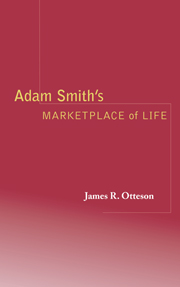Book contents
- Frontmatter
- Contents
- Preface
- Abbreviations
- Introduction
- 1 Adam Smith's Moral Theory, Part One: Sympathy and the Impartial Spectator Procedure
- 2 Adam Smith's Moral Theory, Part Two: Conscience and Human Nature
- 3 The Marketplace of Morality
- 4 The “Adam Smith Problem”
- 5 The Market Model and the Familiarity Principle: Solving the “Adam Smith Problem”
- 6 Justifying Smithian Moral Standards
- 7 The Unintended Order of Human Social Life: Language, Marketplaces, and Morality
- Conclusion
- Bibliography
- Index
6 - Justifying Smithian Moral Standards
Published online by Cambridge University Press: 05 June 2012
- Frontmatter
- Contents
- Preface
- Abbreviations
- Introduction
- 1 Adam Smith's Moral Theory, Part One: Sympathy and the Impartial Spectator Procedure
- 2 Adam Smith's Moral Theory, Part Two: Conscience and Human Nature
- 3 The Marketplace of Morality
- 4 The “Adam Smith Problem”
- 5 The Market Model and the Familiarity Principle: Solving the “Adam Smith Problem”
- 6 Justifying Smithian Moral Standards
- 7 The Unintended Order of Human Social Life: Language, Marketplaces, and Morality
- Conclusion
- Bibliography
- Index
Summary
Adam Smith thinks that human beings are born with a large package of instincts, abilities, desires, and propensities that are channeled or influenced, but not created, by their environment. All of us, for example, have an innate capacity to experience anger, resentment, joy, happiness, sadness, hunger, thirst, and sexual attraction, among many other things. The peculiarities of one's environment determine and limit the range of which particular things will be the objects of one's desires and aversions, as well as under which particular circumstances one will feel or act on various motivations. But the desires, aversions, and motivations themselves are given by our nature. The characteristic of human nature that Smith thinks principally bears on moral standards and moral judgments is, as we have seen, the desire for mutual sympathy, though other characteristics—like one's natural partiality for oneself and the natural interest one has in the fortunes of others—play important roles as well.
Smith argues that these characteristics operate within the context of a community to create a system of morality that includes “objective” moral standards and that forms the foundation of the moral judgments that people in the community make. A person's desire for mutual sympathy of sentiments will lead him to moderate the partiality he has for himself, because he finds that others do not have the same partiality for him, and to try to excite the sentiments of spectators, because he finds that others tend to be partial to themselves.
- Type
- Chapter
- Information
- Adam Smith's Marketplace of Life , pp. 199 - 257Publisher: Cambridge University PressPrint publication year: 2002



